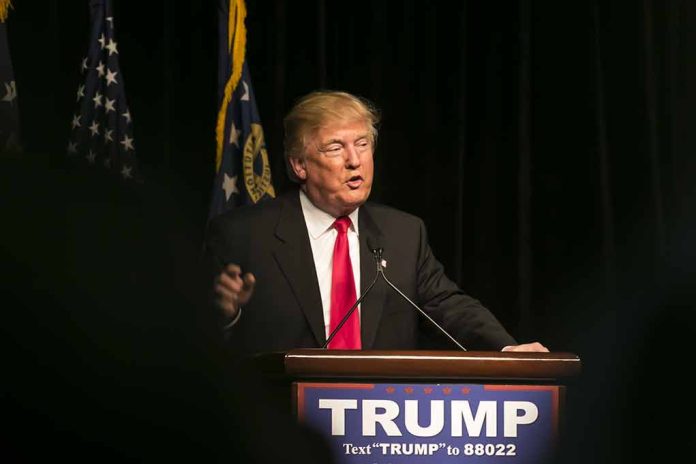
President Trump calls India’s airstrikes in Pakistan “a shame” as tensions escalate to dangerous levels between nuclear-armed neighbors in the long-contested Kashmir region.
Key Takeaways
- President Trump expressed concern about India’s recent airstrikes on Pakistani territory, calling the situation “a shame” while hoping the conflict “ends very quickly”
- India conducted precision strikes on terrorist camps in Pakistan and Pakistan-occupied Kashmir in “Operation Sindoor,” targeting 9 sites in retaliation for a terrorist attack that killed 26 people
- Pakistan has vowed to retaliate against India’s strikes, with Prime Minister Shehbaz Sharif claiming attacks occurred in five locations
- The airstrikes targeted areas linked to terrorist groups Lashkar-e-Taiba and Jaish-e-Mohammed, with India emphasizing that no Pakistani military facilities were targeted
- The conflict follows India’s implementation of punitive measures against Pakistan, including the suspension of the Indus Waters Treaty and the downgrading of diplomatic ties
Trump Responds to Escalating Kashmir Crisis
President Donald Trump has expressed concern over India’s recent airstrikes in Pakistani-controlled Kashmir, describing the situation as “a shame” while acknowledging the long-standing tensions between the two nuclear-armed neighbors. The comments came after India launched “Operation Sindoor,” striking nine terrorist camps in Pakistan and Pakistan-occupied Jammu and Kashmir. These precision strikes were conducted in retaliation for a terrorist attack in Pahalgam that killed 26 people, mostly civilians, marking a significant escalation in the decades-long conflict over the disputed territory.
President Trump indicated he had some prior knowledge of India’s intentions, stating, “We just heard about it as we were walking in the doors of the Oval. I guess we knew something was going to happen based on a little bit of the past.” While not directly condemning either nation, the President expressed hope for a swift resolution, adding, “They have been fighting for many many decades, and centuries when you think about it. Nah, I just hope it ends very quickly.”
Operation Sindoor: India’s Targeted Response
The Indian government has characterized its military operation as a “precise and restrained response” to terrorism emanating from Pakistani soil. Officials emphasized that no Pakistani military facilities were targeted, indicating what they called a “calibrated and non-escalatory approach.” The strikes specifically focused on locations linked to known terrorist organizations, including Muridke and Bahawalpur, which are associated with Lashkar-e-Taiba and Jaish-e-Mohammed, respectively. These groups have long been implicated in cross-border terrorist activities against India, with Pakistan repeatedly accused of providing them safe haven despite international pressure.
“We just heard about it as we were walking through the doors of the Oval. I guess we knew something was going to happen based on a little bit of the past,” stated Donald Trump, the President of the United States
Pakistan’s military confirmed strikes in Bhawalpur, Kotli, and Muzaffarabad, stating they were conducted from Indian airspace. The Pakistani response has been defiant, with officials declaring their right to respond forcefully at a time of their choosing. Pakistan’s Ministry of Foreign Affairs has gone further, labeling India’s actions as “an unprovoked and blatant act of war,” setting the stage for potential further escalation between the nuclear-armed neighbors who have fought multiple wars since gaining independence from British rule in 1947.
Regional Implications of Growing Tensions
The current crisis follows months of deteriorating relations between India and Pakistan. Prior to the airstrikes, India had already implemented a series of punitive measures against Pakistan, including suspending the Indus Waters Treaty, which governs water sharing between the nations, closing the Attari land border crossing, and significantly downgrading diplomatic ties. These actions reflect India’s growing frustration with what it perceives as Pakistan’s unwillingness to crack down on terrorist organizations operating from its territory.
President Trump’s comments highlight the international concerns about the potential escalation between two nuclear powers. As Pakistan’s Prime Minister, Shehbaz Sharif claims attacks occurred in five locations and asserts Pakistan’s right to respond forcefully, the region stands at a dangerous crossroads. The Trump administration faces the delicate challenge of maintaining positive relations with both nations while preventing further military actions that could destabilize South Asia. The Kashmir dispute remains one of the world’s most volatile flashpoints, with civilians on both sides paying the heaviest price for the ongoing conflict.













